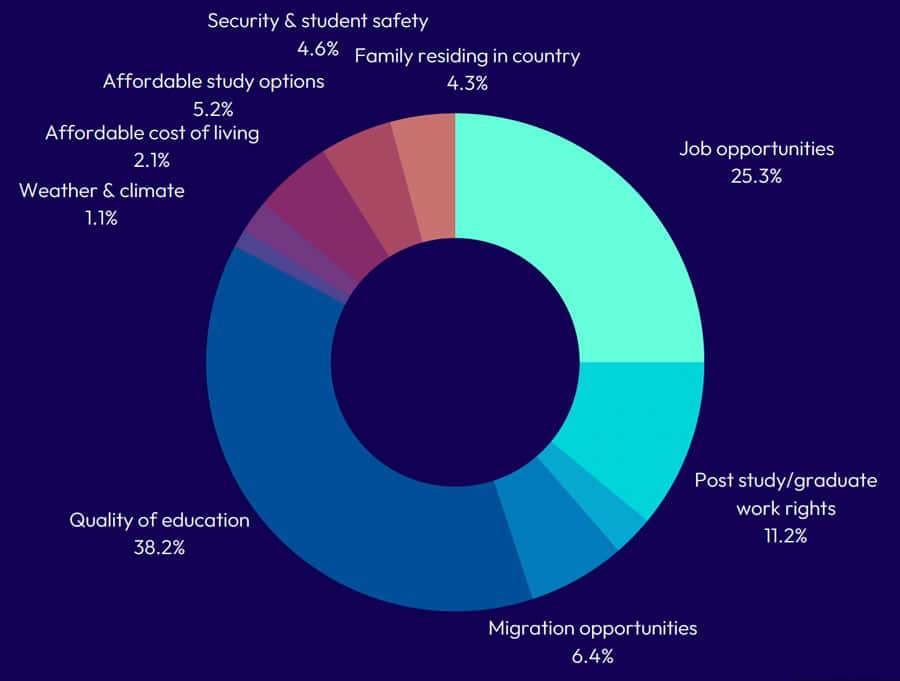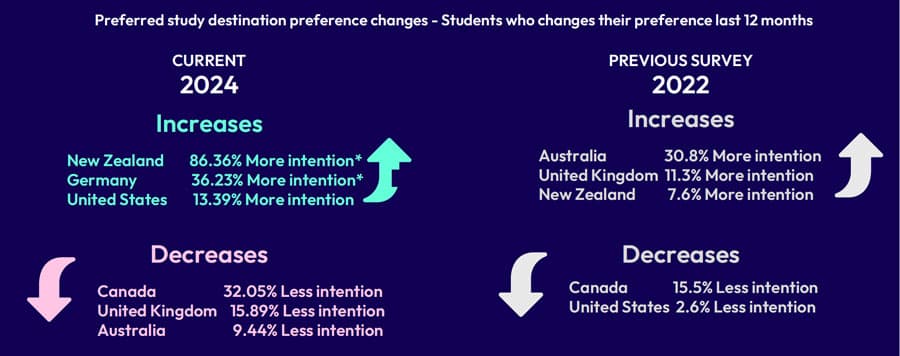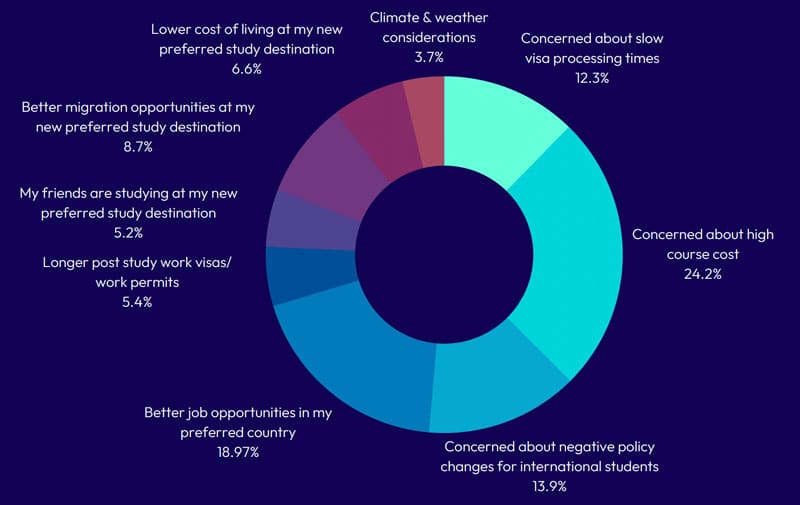The impact of immigration settings, affordability, and job opportunities on international students’ study abroad decisions
- International students continue to be strongly influenced by career considerations and post-study work rights when looking at study abroad options according to new research
- New immigration settings in top destinations are leading to uncertainty in student sending markets, and a significant proportion of surveyed prospective students changing their minds about where to study
- Research continues to show that educators in Canada, Australia, and the UK are being challenged by governmental policy in terms of their international recruitment and communications with students
New research underlines the extent to which international students look closely at work opportunities and immigration policy in general when comparing destinations for study abroad. By extension, the research suggests that:
- There is a tremendous amount of value in education institutions being able to clearly communicate with prospective students about visas, work permits, and immigration opportunities;
- That a lag between official policy announcements and governments communicating in a timely way with educators affected by those policies can greatly hamper institutions’ ability to pass on crucial information to students and agents;
- That new immigration settings in Australia, Canada, and the UK are affecting international students’ motivation to study in these countries.
AECC survey goes out to students in top student markets around the world
Overseas education consultancy AECC conducted a survey in March 2024 of more than 8,300 prospective students in 124 countries (but was not widely distributed in China). The most represented nationalities were:
- India
- Philippines
- Nigeria
- Nepal
- Sri Lanka
- Bangladesh
- Indonesia
- Malaysia
- Vietnam
- Singapore
The survey found that more than half of surveyed students were interested in working in their host country after studying (56%), while a smaller proportion (28%) hoped to emigrate to that country. Only 16% wanted to leave immediately after completing their studies.
Not surprising – given the high demand for work experience abroad – is that 79% of students said post-study work rights were extremely important to them when considering study abroad. Another 19% said they were moderately important and less than 3% said they were not important.
The next screenshot from the AECC slide deck underlines that job opportunities and work rights are about as influential as quality of education for international students making choices about study abroad. Much lower on the list of priorities are migration opportunities.

Demand is decreasing for Australia, Canada, and the UK
About 1 in 6 surveyed students said that they had changed their destination preference in the past 12 months. Among those students, interest had increased for New Zealand (+86%), Germany (+36%), and the US (+13%). It had decreased markedly for Canada (-32%) and had also weakened for the UK (-16%) and Australia (-9%).
When looking at the screen shot below, it’s important to note (1) the asterisks signalling that the increases for New Zealand and Germany are in a context of relatively smaller volumes choosing those destinations overall, and that 2022 data findings were in a context of the first “post-COVID” era (e.g., Australia had just opened its borders).

Of those students who had changed their destination preference, most were motivated to do so because of the high fees in their original country of choice (24%), but significant proportions were also influenced by “negative policy changes for international students” (14%) and “better job opportunities in my [new] preferred country.”

Ascent One survey highlights need for clear communications to students and agents
Ascent One – a platform for higher education providers to manage agent networks, admissions, and marketing – also published findings this month of its own survey of just over 1,000 current, former, and prospective international students from China, India, Philippines, and Colombia. These students were asked specifically about their experience relating to studying in Australia. China, India, Philippines, and Colombia are among Australia’s top student source countries.
From this survey, an important and potentially worrisome finding emerged: 41% of prospective and current students were not aware of current migration settings in Australia. Of those who did know, over three-quarters (77%) had to find out on their own. Another 15% learned about Australian visa and work policies through their agent.
More than a quarter (27%) of prospective students who had found about tighter immigration controls (which dovetail with soaring visa rejection rates) said they are less likely to pursue plans to study in Australia. (The trend of lower student demand has emerged in IDP and Studyportals research as well this year – and for Canada and the UK as well as Australia.)
The study also found that:
- The main reason surveyed international students choose to study in Australia is “better career opportunities post-study” (63%);
- Only 23% of current students are working in a job that is related to their studies;
- 44% of former students are working in a job that is not related to their studies.
Of those who said they were not working in a job related to their studies, more than a third (37%) said they were ineligible to apply for a job – or had been rejected for a job – because they did not have an Australian permanent resident visa or full-time work rights.
Markets like certainty, and student markets are no exception
There is a lot of confusion about immigration policies, visas, and work rights this year in Australia – as well as Canada – given a lag between government announcements of new settings and institutions being fully briefed on what this means for their operations and students. This, in turn, has made it difficult for institutions to provide the kind of clarity and communications they would ideally like to provide their students and agents.
Despite the more challenging environment for international students in Australia, however, the Ascent One survey found that 85% of current and former students enrolled in Australian institutions would recommend Australia as a place to study to their friends and family in their home country.
Of the survey findings, Naresh Gulati, founder and CEO of Ascent One said:
“Our survey reveals a big problem right now – the country is sacrificing future Australians at our own cost. The government’s decision to target international student visas to cut migration numbers is already having an impact. Our survey found that of the students who knew about the recent migration policy changes, over three-quarters (77%) found out about the changes themselves and only 15% via their agent, revealing a big communication gap between the government, education providers, agents and students that needs to be fixed. While the majority of students still recommend Australia as a place to study, our reputation as a world-class destination for study is shaky at best and needs urgent attention.”
For additional background, please see:
















